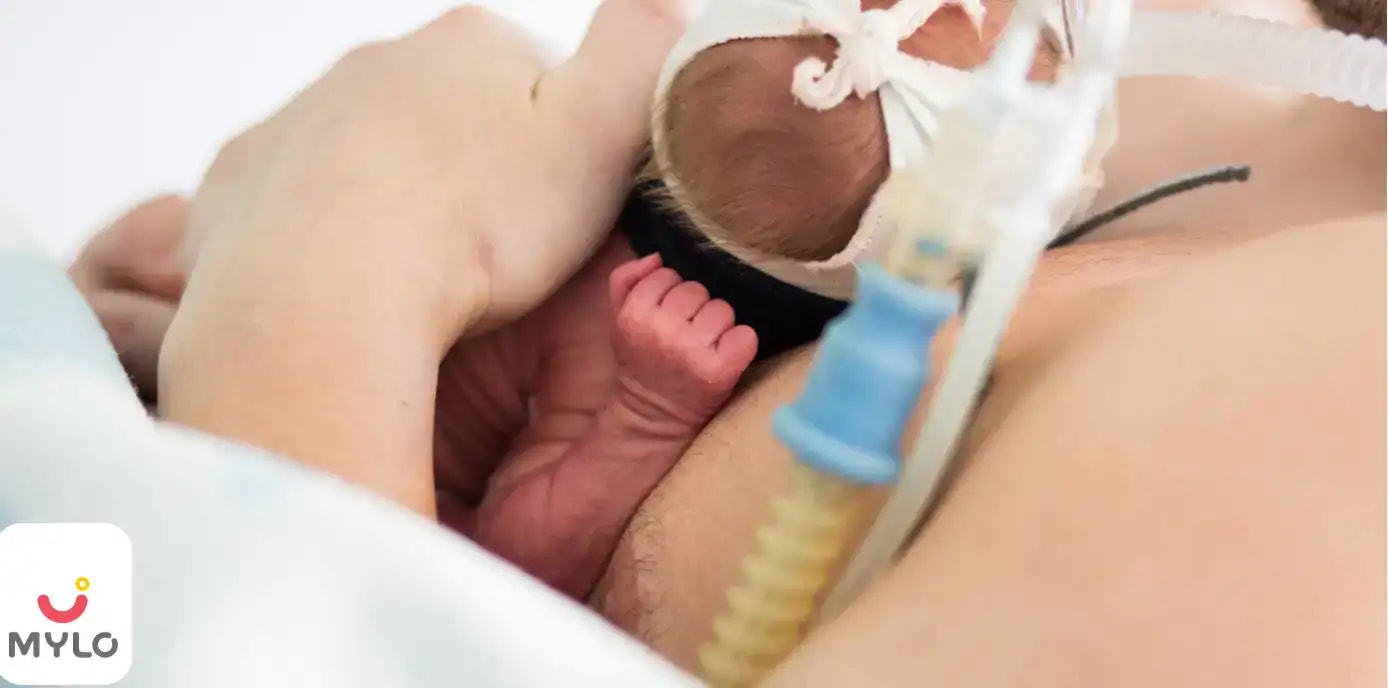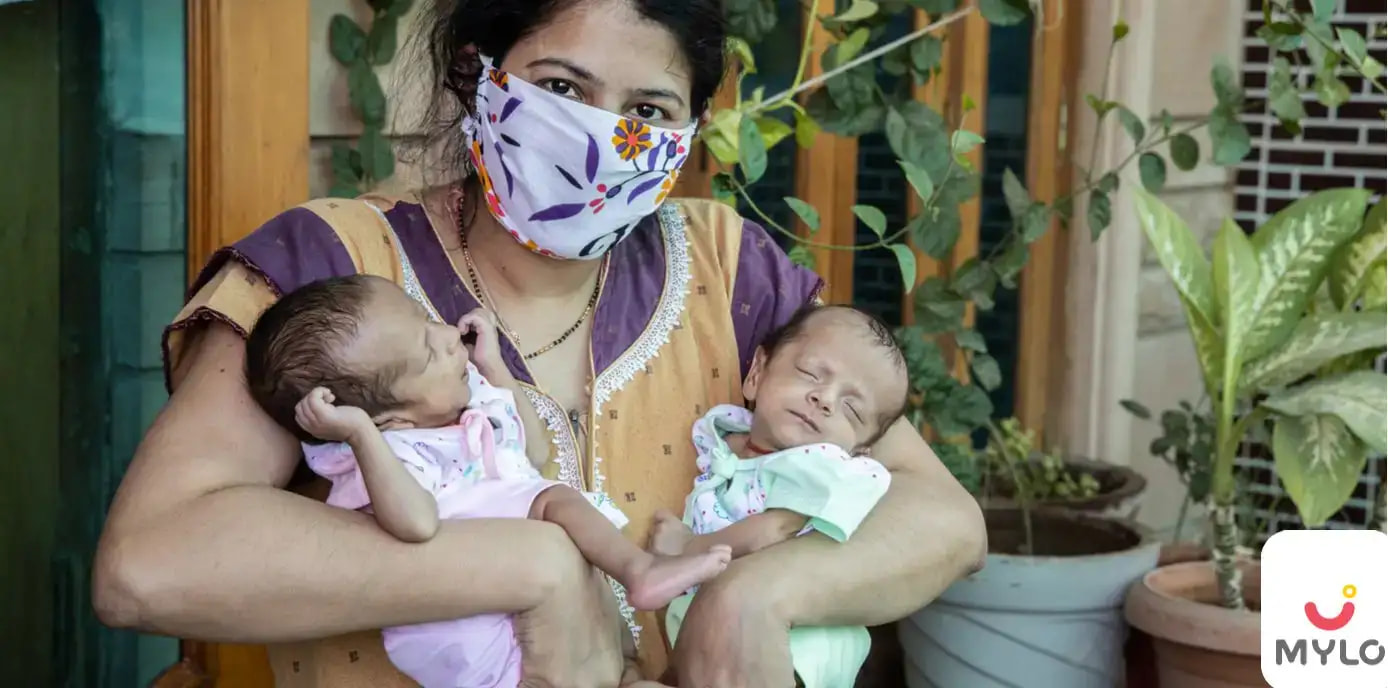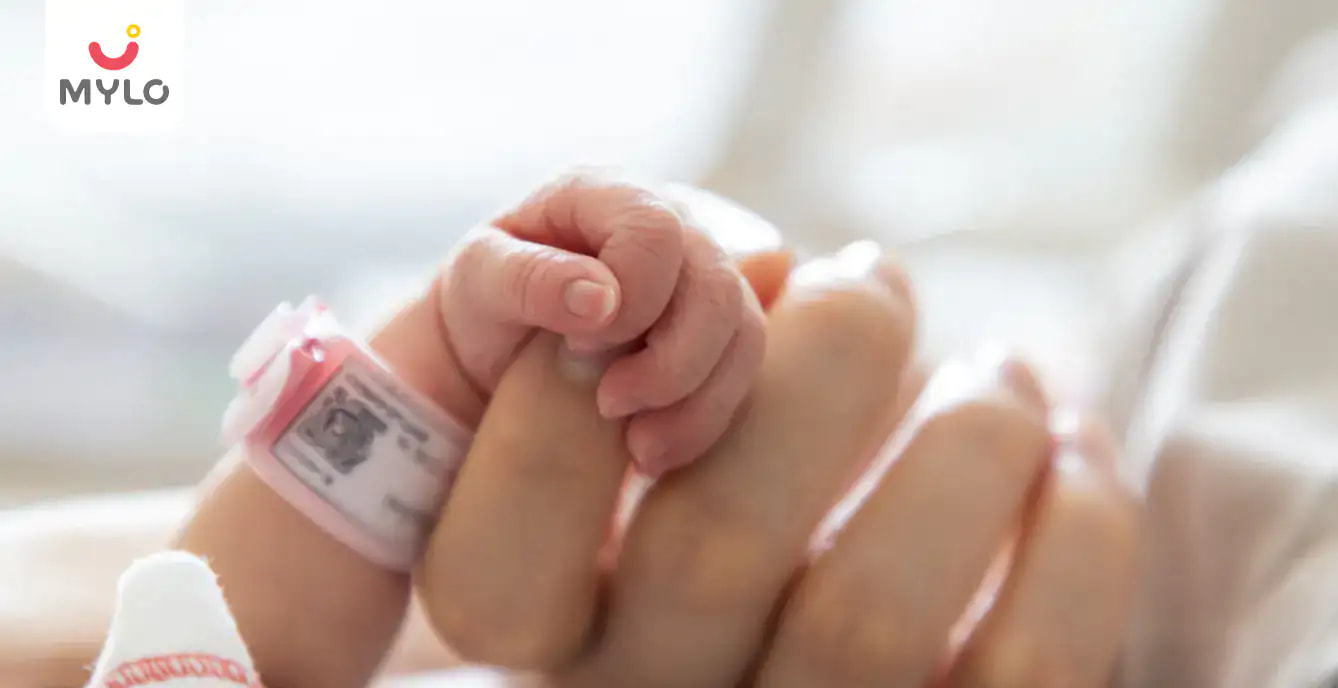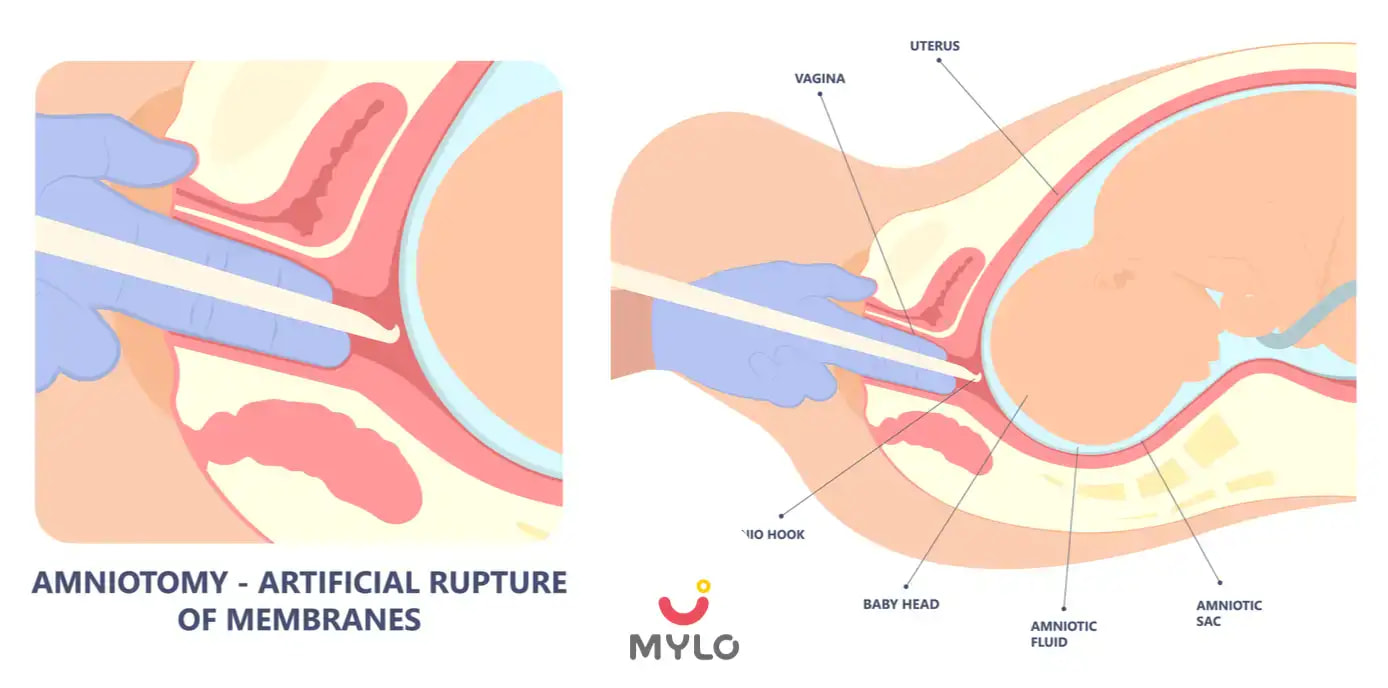Home

Premature Babies

What are the Benefits of Kangaroo Care for Premature Babies?
In this Article

Premature Babies
What are the Benefits of Kangaroo Care for Premature Babies?
Updated on 3 November 2023
Introduction
A premature baby, or a preemie, is a baby born before the completion of 37 weeks of pregnancy. So, why do premature babies need special care? Premature babies may have underdeveloped body parts and systems like the lungs, immune system, digestive system, and skin. This is why they will require intensive care during the first few weeks to months of their lives, depending on how much time before the due date they were born. Though they are not fully ready to deal with the outside environment and are at a higher risk of complications, medical technology has increased their survival rate.
Premature Baby Care
As your preemie will require special care, the following can help you achieve premature baby care.
1. Gain more information about your preemie’s condition
Because being in a neonatal intensive care unit (NICU) can be daunting, write down your queries and get them resolved. This will help relieve your anxiety.
2. Share your concerns
If you observe any changes in your preemie, do share these observations or any other concerns that you may have with your doctor.
3. Establish a milk supply
Breast milk is a rich source of proteins and antibodies that will help in building your preemie’s immune system. Start pumping immediately after the birth to ensure a good milk supply.
4. Spend time with your baby
Bonding with your baby by reading, holding, cradling, or skin-to-skin contact will help you grow closer and establish a stronger maternal bond with your preemie.
5. Taking care of yourself
Avoid neglecting yourself. Take a break and acknowledge your emotions, giving yourself adequate time to heal too.
Kangaroo mother care for premature babies
Due to the increased rate of preemie mortality and lack of space in NICUs in developing countries, a concept called “Kangaroo Mother Care” (KMC) was developed around 25 years ago in Bogota, Colombia. The skin-to-skin contact between mother and infant is called KMC. In KMC, the infant is dressed only in a diaper and cap and is held by the mother in an upright prone (lying on the abdomen) position against the bare chest of the mother. The infant may be covered with a blanket to keep the heat in. The duration of each session of KMC lasts 1-3 hours, during which the infant’s heart, temperature, and breathing are monitored.
Benefits of Kangaroo mother care for premature babies
The benefits of KMC for premature babies are as follows.
- It helps in stabilising the baby’s heart rate.
- It improves the oxygen delivery to the infant’s organs.
- It helps in improving the breathing pattern of the infant, thus regularising the breathing.
- It helps with weight gain.
- It decreases crying.
- It enhances the success of breastfeeding.
- It decreases hospital stays.
How to take care of a premature baby?
Before your preemie can be discharged, they will have to gain a certain amount of predetermined weight, depending on the hospital policy. Till then, how will you take care of your premature baby, and how can you contribute to their improvement? By taking care of the following concerns, you can help prepare yourself and your preemie for discharge.
1. Say yes to “nesting”
Nesting is a process in which you spend a night with your preemie before being discharged. This helps you to gain confidence in holding him/her, changing their diapers and breastfeeding.
2. Find a paediatrician
Before discharge itself, identify a paediatrician who has experience in treating preemies and those who have been discharged from the N.I.C.U. Clear all your doubts and concerns regarding what specialised care your baby will need after discharge, including nursing visits or specialised doctor visits. This can then be identified earlier. So, identify the appropriate doctors to whom you can go for the same.
3. Identification of tests required
Your preemie may require certain tests, including blood, vision, and hearing tests post-discharge to identify whether there are any concerns with your preemie. Make sure that you understand what is required and whom to contact for the same.
4. Learn cardiopulmonary resuscitation (C.P.R.)
C.P.R. is a life-saving process to revive an individual’s heart or breathing after it has stopped. As your baby may be on a monitor and may require C.P.R., it is better to learn the technique and get certified, if possible, within the hospital before the discharge of your baby.
5. Attend a discharge debrief
Prior to the discharge of your preemie, it is best to attend a discharge debrief with the doctors and staff who have been handling your preemie to clear up any concerns and gain confidence in caring for it.
Taking care of a premature baby at home
Once home, you will need to equip yourself to care for your preemie in the absence of medical staff. Though this may seem a daunting task, the following premature baby care tips can help you better prepare for this.
- Ensuring the right temperature for your baby- To ensure this, invest in a digital thermometer and maintain your preemie’s body temperature at 36.5-37.3 C (97.6-99.1 F). The room temperature should be 20-23 C.
- Bathing your baby- The water used for bathing your baby should be warm, not hot. Avoid using any liquid cleansers as these can be harsh on your baby’s skin. Sponge bathing can be done till they reach 2.5 kg.
- Avoid public places and visitors- As preemies are more prone to infections due to their immature immune systems, it is advisable to avoid taking your baby to crowded areas and limit visitors. All guests should be advised to wash their hands before coming into contact with your baby. Also, those with a cough and cold should be restricted from visiting the baby.
- Continue KMC and breastfeeding- Both of these techniques have been proven beneficial to improving the overall health of your baby by helping them gain weight and improving their immunity.
- Prepare for emergencies- Keep the number of the nearest hospital on hand in case of an emergency.
Conclusion
Caring for a premature baby can seem like an intimidating task. However, if you prepare yourself both at the hospital and at home, this can be made easier. KMC and breastfeeding are vital for the growth and development of your preemie. Continuing with these practices will be beneficial to both you and your premature baby. By following the tips and advice provided in this article, you will be able to gain more confidence in caring for your premature baby both in the hospital and at home.
References
- Jefferies AL; Canadian Paediatric Society, Fetus and Newborn Committee. (2012). Kangaroo care for the preterm infant and family. www.ncbi.nlm.nih.gov



Written by
Priyanka Verma
Priyanka is an experienced editor & content writer with great attention to detail. Mother to an 11-year-old, she's a ski
Read MoreGet baby's diet chart, and growth tips

Related Articles
Related Questions
Hello frnds..still no pain...doctor said head fix nhi hua hai..bt vagina me pain hai aur back pain bhi... anyone having same issues??

Kon kon c chije aisi hai jo pregnancy mei gas acidity jalan karti hain... Koi btayega plz bcz mujhe aksar khane ke baad hi samagh aata hai ki is chij se gas acidity jalan ho gyi hai. Please share your knowledge

I am 13 week pregnancy. Anyone having Storione-xt tablet. It better to have morning or night ???

Hlo to be moms....i hv a query...in my 9.5 wk i feel body joint pain like in ankle, knee, wrist, shoulder, toes....pain intensity is high...i cnt sleep....what should i do pls help....cn i cosult my doc.

Influenza and boostrix injection kisiko laga hai kya 8 month pregnancy me and q lagta hai ye plz reply me

Related Topics
RECENTLY PUBLISHED ARTICLES
our most recent articles

Diet & Nutrition
গর্ভাবস্থায় আলুবোখরা: উপকারিতা ও ঝুঁকি | Prunes During Pregnancy: Benefits & Risks in Bengali

Diet & Nutrition
গর্ভাবস্থায় হিং | ঝুঁকি, সুবিধা এবং অন্যান্য চিকিৎসা | Hing During Pregnancy | Risks, Benefits & Other Treatments in Bengali

Women Specific Issues
স্তনের উপর সাদা দাগ: লক্ষণ, কারণ এবং চিকিৎসা | White Spots on Nipple: Causes, Symptoms, and Treatments in Bengali

Diet & Nutrition
গর্ভাবস্থায় পোহা: উপকারিতা, ধরণ এবং রেসিপি | Poha During Pregnancy: Benefits, Types & Recipes in Bengali

Diet & Nutrition
গর্ভাবস্থায় মাছ: উপকারিতা এবং ঝুঁকি | Fish In Pregnancy: Benefits and Risks in Bengali

Diet & Nutrition
গর্ভাবস্থায় রেড ওয়াইন: পার্শ্ব প্রতিক্রিয়া এবং নির্দেশিকা | Red Wine During Pregnancy: Side Effects & Guidelines in Bengali
- ইনার থাই চ্যাফিং: কারণ, উপসর্গ এবং চিকিৎসা | Inner Thigh Chafing: Causes, Symptoms & Treatment in Bengali
- গর্ভাবস্থায় ব্রাউন রাইস: উপকারিতা ও সতর্কতা | Brown Rice During Pregnancy: Benefits & Precautions in Bengali
- Velamentous Cord Insertion - Precautions, Results & Safety
- Unlock the Secret to Flawless Skin: 7 Must-Have Qualities in a Face Serum
- Unlock the Secret to Radiant Skin: How Vitamin C Serum Can Transform Your Complexion
- Gender No Bar: 10 Reasons Why Everyone Needs a Body Lotion
- Unlock the Secret to Radiant Skin How to Choose the Perfect Body Lotion for Your Skin Type
- Top 10 Reasons to Apply a Body Lotion After Every Bath
- Communication in Toddlers: Milestones & Activities
- How to Improve Vocabulary for Toddlers?
- A Comprehensive Guide to Understanding Placenta Accreta
- Vulvovaginitis in Toddlers Causes, Symptoms and Treatment
- A Comprehensive Guide to Understanding Cerebral Palsy in Children
- Bitter Taste in Mouth During Pregnancy: Understanding the Causes and Remedies


AWARDS AND RECOGNITION

Mylo wins Forbes D2C Disruptor award

Mylo wins The Economic Times Promising Brands 2022
AS SEEN IN

- Mylo Care: Effective and science-backed personal care and wellness solutions for a joyful you.
- Mylo Baby: Science-backed, gentle and effective personal care & hygiene range for your little one.
- Mylo Community: Trusted and empathetic community of 10mn+ parents and experts.
Product Categories
baby carrier | baby soap | baby wipes | stretch marks cream | baby cream | baby shampoo | baby massage oil | baby hair oil | stretch marks oil | baby body wash | baby powder | baby lotion | diaper rash cream | newborn diapers | teether | baby kajal | baby diapers | cloth diapers |








